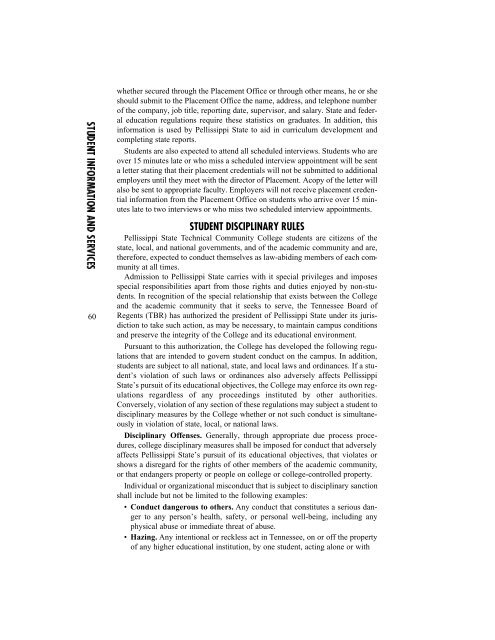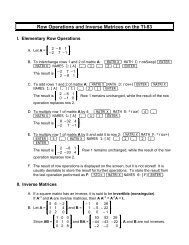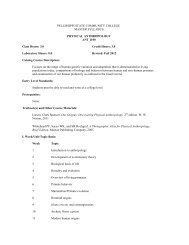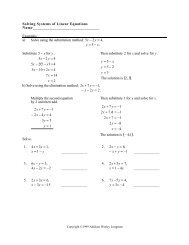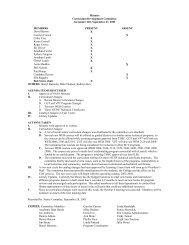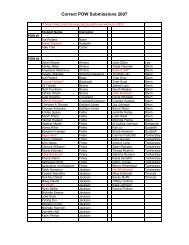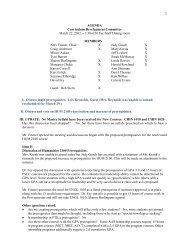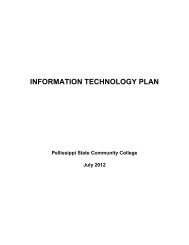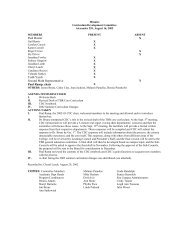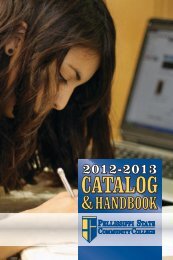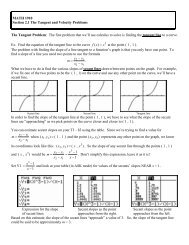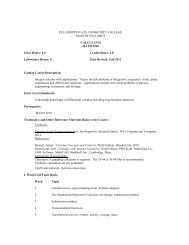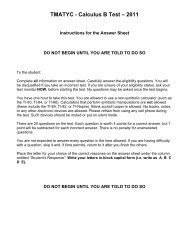Program Description - Pellissippi State Community College
Program Description - Pellissippi State Community College
Program Description - Pellissippi State Community College
You also want an ePaper? Increase the reach of your titles
YUMPU automatically turns print PDFs into web optimized ePapers that Google loves.
60<br />
whether secured through the Placement Office or through other means, he or she<br />
should submit to the Placement Office the name, address, and telephone number<br />
of the company, job title, reporting date, supervisor, and salary. <strong>State</strong> and federal<br />
education regulations require these statistics on graduates. In addition, this<br />
information is used by <strong>Pellissippi</strong> <strong>State</strong> to aid in curriculum development and<br />
completing state reports.<br />
Students are also expected to attend all scheduled interviews. Students who are<br />
over 15 minutes late or who miss a scheduled interview appointment will be sent<br />
a letter stating that their placement credentials will not be submitted to additional<br />
employers until they meet with the director of Placement. Acopy of the letter will<br />
also be sent to appropriate faculty. Employers will not receive placement credential<br />
information from the Placement Office on students who arrive over 15 minutes<br />
late to two interviews or who miss two scheduled interview appointments.<br />
STUDENT DISCIPLINARY RULES<br />
<strong>Pellissippi</strong> <strong>State</strong> Technical <strong>Community</strong> <strong>College</strong> students are citizens of the<br />
state, local, and national governments, and of the academic community and are,<br />
therefore, expected to conduct themselves as law-abiding members of each community<br />
at all times.<br />
Admission to <strong>Pellissippi</strong> <strong>State</strong> carries with it special privileges and imposes<br />
special responsibilities apart from those rights and duties enjoyed by non-students.<br />
In recognition of the special relationship that exists between the <strong>College</strong><br />
and the academic community that it seeks to serve, the Tennessee Board of<br />
Regents (TBR) has authorized the president of <strong>Pellissippi</strong> <strong>State</strong> under its jurisdiction<br />
to take such action, as may be necessary, to maintain campus conditions<br />
and preserve the integrity of the <strong>College</strong> and its educational environment.<br />
Pursuant to this authorization, the <strong>College</strong> has developed the following regulations<br />
that are intended to govern student conduct on the campus. In addition,<br />
students are subject to all national, state, and local laws and ordinances. If a student’s<br />
violation of such laws or ordinances also adversely affects <strong>Pellissippi</strong><br />
<strong>State</strong>’s pursuit of its educational objectives, the <strong>College</strong> may enforce its own regulations<br />
regardless of any proceedings instituted by other authorities.<br />
Conversely, violation of any section of these regulations may subject a student to<br />
disciplinary measures by the <strong>College</strong> whether or not such conduct is simultaneously<br />
in violation of state, local, or national laws.<br />
Disciplinary Offenses. Generally, through appropriate due process procedures,<br />
college disciplinary measures shall be imposed for conduct that adversely<br />
affects <strong>Pellissippi</strong> <strong>State</strong>’s pursuit of its educational objectives, that violates or<br />
shows a disregard for the rights of other members of the academic community,<br />
or that endangers property or people on college or college-controlled property.<br />
Individual or organizational misconduct that is subject to disciplinary sanction<br />
shall include but not be limited to the following examples:<br />
• Conduct dangerous to others. Any conduct that constitutes a serious danger<br />
to any person’s health, safety, or personal well-being, including any<br />
physical abuse or immediate threat of abuse.<br />
• Hazing. Any intentional or reckless act in Tennessee, on or off the property<br />
of any higher educational institution, by one student, acting alone or with


